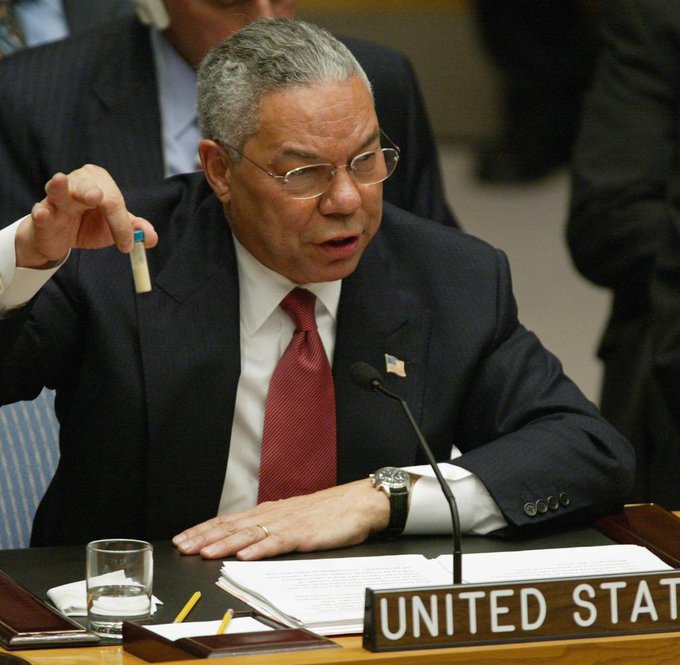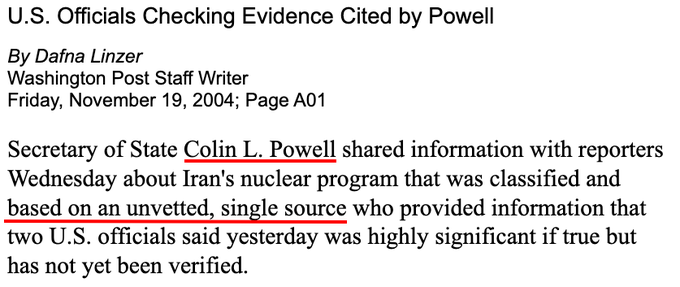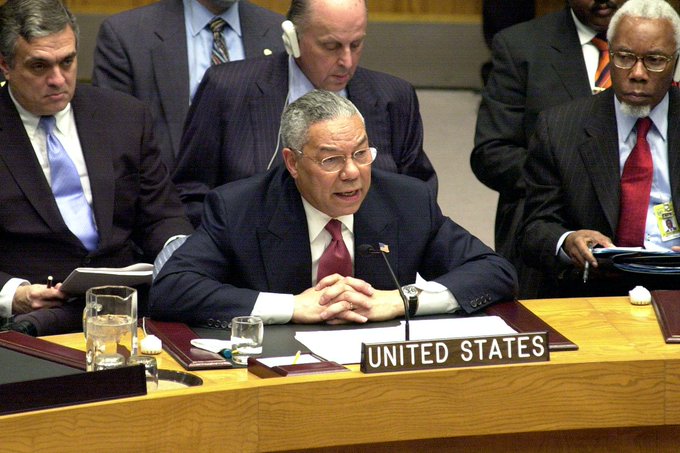i hope you read elaine's 'Barbra Streisand is one stupid bitch' because i enjoyed it and it made me realize, barbra streisand doesn't care about dead people.
she's never given a 2nd thought to the palestinians. they're slaughtered daily. she doesn't care.
so it's not at all surprising that she's rushed forward to embrace war criminal colin powell.
if you're arab, she just doesn't care. that's become obvious.
let's ignore barbra's lies as she rushed to praise war criminal powell and note some tweets of truth.
There were 275,000-306,000 direct deaths in the Iraq war after Colin Powell lied to the UN there were WMD in Iraq, victims of the Bush/Cheney/Rumsfeld/Powell war of aggression. It matters little whether Powell was an eager enabler or a coward who couldn't stand up to Bush.
that's who barbra choose to praise.
f**k that racist bitch.
let's close with c.i.'s 'Iraq snapshot:'
Friday, October 22, 2021. Climate change, no progress on forming a new government in Iraq and, yes, another day of St Powell.
Starting with this from ROYA NEWS:
Weeks before the COP26 Climate Conference, which will be held in Glasgow in early November, US intelligence said that "the geopolitical tension will worsen because there will be disagreements among countries over how to reduce greenhouse gas emissions to achieve the goals of the Paris Agreement."
The report, which includes a summary of the investigations of all US intelligence agencies, added that the melting of the ice in the Arctic "essentially increases strategic competition for access to its natural resources."
Elsewhere, with rising temperatures and more extreme weather extremes, "there is an increased risk of water conflicts and migration, especially after 2030," the report said.
Yet senators Joe Macnhin and Jon Tester are opposed to a carbon tax. Julie Watson, Ellen Knickmeyer and Nooman Merchant (AP) explain:
The estimate identified 11 countries of particular concern: Afghanistan, Colombia, Guatemala, Haiti, Honduras, India, Iraq, Myanmar, Nicaragua, North Korea and Pakistan. It also lists two regions of concern: Central Africa and small island states in the Pacific Ocean.
Strains on land and water could push countries further toward conflict. In South Asia, much of Pakistan relies on surface water from rivers originating in India. The two countries are nuclear-armed rivals that have fought several wars since their founding in 1947. On India's other side, about 10% of Bangladesh's 160 million people already live in coastal areas vulnerable to rising seas and saltwater intrusion.
Intelligence officials who spoke on condition of anonymity under agency rules said climate change could indirectly affect counterterrorism by pushing people seeking food and shelter to violent groups.
The intelligence community needs more scientific expertise and to integrate climate change into its analysis of other countries, the officials said.
The United Nations says there may be as many as 200 million climate-displaced people worldwide by 2050.
Olivia Gazis (CBS NEWS) notes:
Countries will increasingly compete to secure their own interests, including in places like the Arctic, where melting sea ice has fueled a race to access oil, gas and mineral resources and to establish new shipping routes.
While wealthier, more developed countries, including the U.S., are in a "relatively better position" to deal with the costs and risks associated with climate change, the report says that "impacts will be massive even if the worst human costs can be avoided."
The assessment says some unforeseen events could alter its projections, including a significant technological breakthrough or, conversely, a global climate disaster that would mobilize countries to take action.
In Iraq, the effects are being felt. INTER REVIEWED notes:
Throughout marshes usually hailed as the unique Backyard of Eden and on the baking lands past, inhabitants now face a alternative. “Will we keep or will we go?” sighed Raad al-Ghali, a buffalo herder within the historic marshland of Chibayish whereas lately sheltering within the shadow beside his tent.
“Everyone seems to be struggling as of late. We don’t know what to do.”
In Chibayish’s labyrinth of winding waterways, water ranges have dropped. Salt and air pollution are killing the reeds. To maintain their animals alive, residents fill rickety boats with consuming water bought miles away.
Close by fields have turned brown. Orchards and roses have disappeared, and the palm bushes are dying slowly. Within the border city of Siba, water for irrigation is so salty it’s poisoning the harvest.
“We used to develop greenhouses of cucumbers,” recalled a farmer, Abu Ahmed, 52, standing in his desiccated farm. “Now we don’t actually have a single cucumber’s price of contemporary water. How can we proceed right here?”
Iraq will have to import more food goods. ISIS never left Iraq and it previously used some effects of climate change to take control back in 2014. There are numerous threats that were and remain present and are unique to Iraq as well as issues that they, like other countries face.
Meanwhile THE FINANCIAL TIMES OF LONDON weighs in with:
When Iraqis braved violence to vote in their country’s first election
two years after the 2003 US-led invasion toppled dictator Saddam
Hussein, then President George W Bush stated that Iraqi “men and women
have taken rightful control of their country’s destiny”. Yet 16 years
and five parliamentary elections later, Iraqis are still waiting for
Bush’s words to ring true.
In this month’s election, just 41 per cent of registered voters bothered
to cast ballots, the lowest turnout in the post-Saddam era. The apathy
underscored the disillusionment Iraqis have for the democratic
experiment ushered in by the Bush administration that promised so much
but has, so far, delivered so little.
At successive elections, Iraqis’ common refrain is that the same old
factions are competing in a system rotten with corruption and patronage,
a system that has squandered the oil-rich country’s wealth and failed
to provide jobs and basic services.
The latest election was won by a bloc led by Moqtada al-Sadr, a maverick
cleric whose Mahdi Army spearheaded the Shia resistance against the
US-led occupation and was a protagonist in the sectarian violence that
pushed Iraq to the brink of civil war. In politics, he models himself as
a champion of the Shia poor and a nationalist who will negate the
competing — and destabilising — influences of the US and Iran.
Voter apathy? At a time when the US president is Joe Biden? It's cure the way editorial board ignores the fact that in 2010 then-Vice President Joe Biden oversaw The Erbil Agreement which set aside the Iraqi peoples votes and gave a second term to Nouri al-Maliki. It's cute the way that they rush to hail Moqtada as the victor.
His bloc -- not party -- got the most seats in the election. But not enough seats to create a government. It's days later and he's not been able to move forward which indicates that a large number of others don't want to join a Moqtada coalition. It wouldn't be that surprising if thug Nouri announced in a few days that he had enough members to form a government. Nouri knows how to sway political leaders. Moqtada apparently is still learning. All. These. Years. Later.
Mina al-Oraibi (THE NATIONAL) offers:
It is close to certain that the next government will be formulated largely by cleric Moqtada Al Sadr, who is set to have the largest number of seats in Parliament. By the current tally, the Sadrists will hold 73 of the 329 seats in parliament – the largest grouping in the legislature. But Mr Al Sadr will need to go into a coalition in order to get a majority capable of forming a government. The horse-jockeying and coalition-forming efforts currently taking place in Baghdad can take months – as has happened after previous elections. But more worrying is uptick in the rumour mill about fraud and ballot box tampering. The longer the process takes, the more damaging it is to the prospect of a stable transition. The transparency and orderliness in the lead-up to election day on October 10 is slowly but worryingly giving way to questions about the opaque nature of counting votes, finalising tallies and forming the government.
As political brinkmanship between various parties continues, Iraq’s Independent High Election Commission (IHEC) is currently looking into 1,372 appeals contesting the declared results of the elections. An IHEC official told The National this week that he does not foresee a major change in the final outcome of the elections as a result of the appeals. However, with the deep fragmentation among the parties, one or two seats changing sides can make all the difference in who forms the next government.
After looking into the appeals, IHEC will send them to the Judicial Commission, which will then review them. Once the Commission clears those appeals, the results will be sent to the High Federal Court for ratification. When they are ratified, Iraqi President Barham Salih will have to call Parliament into session. At every step, there will be efforts from a myriad of political actors, and particularly those who are set to lose out, to influence the results.
Iraqis fear the possibility of the electoral process failing like it did in 2010. In those elections, the former prime minister Ayad Allawi’s nationalist bloc, Al Iraqiya, won more seats than any other, with 91 seats, and so should have formed the government. However, then incumbent prime minister Nouri Al Maliki, with his State of Law list gaining 89 seats at the time, formulated a coalition of parties after the elections that allowed him to usurp Mr Allawi's success and form the government. Mr Al Sadr has already alluded to 2010 in remarks last week, insisting that he is “no Allawi”.
At this point, there's no new government, THE NEW ARAB takes a look at what took place in the Kurdistan:
At the same time, the vote has changed the political reality in Iraq’s autonomous Kurdistan Region, giving more power to some parties while humiliating others.
The election saw a record low turnout, with many boycotting the vote due to scepticism about the system and widespread disapproval of the parties who have ruled the country for years. On average, however, more Kurdish voters showed up to the polls than in other Iraqi provinces.
The official preliminary results from the Iraqi Independent High Electoral Commission (IHEC) late on Saturday showed that the Kurdistan Region’s ruling party maintained a larger vote share in Iraq than it did in the previous 2018 election.
The Kurdistan Democratic Party (KDP) has preliminarily pocketed 33 seats, an increase from the 25 they earned in the controversial 2018 elections. The party was already celebrating victory for six days when the official preliminary results came out, with crowds flooding the streets celebrating with fireworks, and, at times, celebratory gunfire.
The results came as a shock for other parties. While the Patriotic Union of Kurdistan (PUK) continued to enjoy influence by winning 16 seats, only two less than the previous election, their partner in the Kurdistan Coalition hit rock bottom.
Gorran (Change Movement) faced an electoral humiliation, with the party going from five seats in the Iraqi parliament to zero this time around.
Those results aren't shocking. We noted them on Monday, yes. We also noted ahead of the elections, weeks ahead, that the PUK was going to do even worse than they did previously. The PUK still thinks that they should be able to hold the presidency (of Iraq) and you have to wonder why they think that is? They're no a *majority* party. What makes them any more important than other minority parties in the Kurdistan. (The Kurds, by custom, get the presidency of Iraq.)
Moving over to the sad news that Colin Powell wasn't Jesus Christ. It is now three days and counting yet despite the hosannas in the press, St Powell of The Blot has not risen.
And in the midst of the effort to sell Colin as a saint, this stupid Tweet went up.
A well known educator brought that to my attention. He called and asked why I hadn't pointed that out. I didn't know about and why haven't you pointed it out, I asked back. He has to go on programs like Aaron's and can't ruffle feathers. I will never be on any podcast -- that's not a salm, that's me being lond done with media. Even now, you have to be a friend or a friend of a friend to get me to speak to you, I'm just done with interviews. Equally true, Aaron doesn't cover entertainment so there's no reason offline me would ever be asked. But Aaron Mate Tweeted that nonsense.
And it goes to the glorification of Aaron Mate. He's as mispraised as Colin Powell. I'm still waiting for his great scoop. He likes to point out that DEMOCRACY NOW gets things wrong today. But they also did while he was there and he kept his mouth shut. I guess that's his m.o., irght? Keep your mouth shut because that is what he's advising.
We'll highlight THE GREY ZONE and we'll even highlight Aaron but I don't mistkae him for some ground breaking journalist. At his best, he steers some attention to the work of others. At his best. When Jimmy Dore brings him on, I try to avoid it because I know Aaron is nothing but a little bitch boi. Are you surprised that he defended Ryan Grim and covered for Ryan on jimmy's show? Are you surprised that as evidence of corruption within tthe Biden family continues to mouth, Aaaron dismisses it to Jimmy Dore and excuses corruption?
Why are you surprised?
This is the little bitch who was with DEMOCRACY NOW! for how many years? Every episode Amy Goodman ended by verbalizing the credits (because it started as a radio show). And every episode for years, she mispronounced his last name. How pathetic do you have to be that you don't go to someone and explain that's not how you say your name?
So in the face of massive lies and the rwriting of history, Aaron's advice is for people on the left to close their mouths and say nothing. That certainly explains his lousy career. I guess he's content to let Max be the voice of truth at THE GREY ZONE. FOrtunately, Max's back is strong enough that he can carry Aaron . . . for now.
Nashwa Lina Teets:
That's called perspective. Aaron lacks it.
Any fair reading of Powell’s central role would dispute the narrative that there was an “intelligence failure” nor would it withstand the slightest scrutiny.
It thus begs the question why Powell has escaped censure if facts point out that top experts in their respective fields within the US intelligence community had correctly assessed that Iraq did not have WMD or ongoing WMD programmes?
Powell was an integral part of the Bush administration’s neocons who subverted intelligence for a specific agenda. In other words, the policy was not based on the intelligence, but the CIA’s intelligence products were rather based on the policy.
Though Powell and Donald Rumsfeld died without any accountability for the horrendous war crimes perpetrated, one hopes that George W Bush, Condoleezza Rice and all others who were the architects of America’s illegal wars will face prosecution.
Thomas Knapp (COUNTERPUNCH) notes:
Iraqi journalist Muntader al-Zaidi (famous for throwing his shoes at then-president George W. Bush during a 2008 Baghdad press conference) puts it bluntly: “I am saddened by the death of Colin Powell without being tried for his crimes in Iraq. But I am sure that the court of God will be waiting for him.”
Assurances of a final judgment in the afterlife aside, Powell’s life since 2003 has been a case of justice delayed, his death a case of justice denied.
Other Iraq war criminals, however, remain at large.
Bush fancies himself an artist these days, when he’s not hobnobbing with Ellen DeGeneres at football games.
Former national security advisor (and Powell’s successor as Secretary of State) Condoleezza Rice teaches at Stanford.
Former US Deputy Secretary of Defense Paul Wolfowitz went on to head the World Bank and currently enjoys a sinecure at the American Enterprise Institute.
And there are others.
They’re not paying for their crimes. They’re not absconding to non-extradition countries one step ahead of arrest and trial. They’re enjoying the good life, seemingly unworried at the prospect of ever facing justice.
That’s something that can, and should, change.
The following sites updated:








